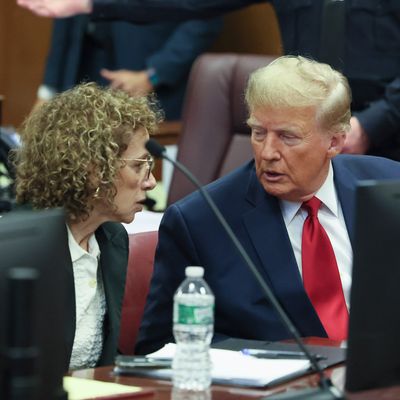
Today should, by all rights, be Trial Haircut Day.
This is the sacred ritual wherein prosecutors go see the barber or stylist and get tidied up, shortly before jury selection begins. There’s a delicate art to it. Ideally, you get the preparatory cut a few days before trial, just in case the barber gets a little overzealous and leaves you chopped. (It’s happened to me; it’s not great standing in front of the jury looking like Matthew Modine in Full Metal Jacket.) The trial cut typically peaks around 10 to 12 days in and steadily degrades from there. Urban legend has it that one should never get a mid-trial haircut, but that doesn’t work for a three- or four-month affair; you need to sharpen up at some point.
For months now, we’ve had Monday, March 25, circled on the calendar as the start date for the first-ever criminal trial of a former U.S. president: The People of the State of New York v. Donald J. Trump, in Manhattan, for falsification of business records relating to hush-money payments before the 2016 election. The judge had denied Trump’s last-gasp (or, as it turns out, second-last-gasp) delay efforts, and the jury pool was ready to go. This thing was on, for real.
Until it wasn’t. Suddenly last week, the hush-money case hit a procedural ditch. Now the Manhattan prosecution joins its three counterparts in suspended animation. Over the past month, the axis has tilted on all four pending Trump cases, generally for the worse for prosecutors. And while we still will probably see at least one Trump trial before the election, there’s a creeping likelihood that we won’t see any, or any of the Big Ones.
As we head into the heart of the general-election campaign, let’s reassess where each case stands. I’ll violate a cardinal rule of legal prognostication here and give you scientifically precise, airtight numerical calculations of the likelihood each case gets tried before the election. No lawyerly hedging here; just hopelessly speculative mathematical precision prevails.
Manhattan District Attorney (Hush Money): 70 percent
Ten days ago, I would’ve had this up in the mid-90s. But suddenly, the case hit a snag. Here’s the crux of it. Back in 2021, when Trump was about to leave office, federal prosecutors at the Southern District of New York (my former office) considered whether to charge Trump with campaign-finance crimes relating to hush-money payments. After a series of internal discussions, the Feds declined, largely because they did not fully trust Michael Cohen, who would’ve been a central witness. Fast-forward a couple years, and the Manhattan DA decides to bring state-level charges that rest largely on Cohen’s testimony.
Now, imagine for a moment that you’re Trump’s lawyers. What’s your move? Right: You need to get those files from the Feds. (Keep in mind that a defendant is legally entitled to any evidence in the possession of prosecutors that might aid the defense.) Why did the famously aggressive SDNY reject the case? What’s in its files that undercuts Cohen and might help your defense?
Long story short, the SDNY only recently started turning over tens of thousands of documents to Trump’s team. The Manhattan DA has acknowledged that at least some of those documents are relevant to the defense, and acceded to a postponement of the trial for at least 30 days. Judge Juan Merchan ruled that trial won’t start until mid-April, and maybe later than that.
The question now is whether the discovery issue snowballs. Judge Merchan has demanded a detailed accounting from prosecutors on what went wrong. The judge pointedly noted that “there are significant questions of fact” relating to prosecutors’ delay in producing discovery, and that he will set a new trial date “should one be necessary.”
I suspect the parties will eventually get this issue worked out and that we’ll still have a trial sometime late spring or early summer. (A bit of good news for those hoping a Trump conviction might sink his 2024 electoral chances: New polling by Politico shows that 36 percent of independents would be less likely to vote for Trump if he’s convicted in this case.) But now there’s some uncertainty around when, and whether, that’ll happen.
Fulton County District Attorney (2020 Election Subversion): 1 percent
District attorney Fani Willis just barely survived a defense motion to disqualify, but her credibility is in tatters. The judge stopped half an inch short of finding that Willis committed perjury; he noted that an “odor of mendacity” remains, that “reasonable questions” persist about whether the DA “testified untruthfully,” and that her inflammatory public commentary was “legally improper.” Prosecutorial careers have ended over less.
The DA has requested a trial starting in August, running up to and through the election and concluding in 2025. There’s just no practical way that happens. This case will likely be the last one tried, and only philosophical concern about whether anything is truly impossible prevents me from putting this at zero percent.
DOJ Special Counsel Jack Smith (2020 Election Subversion): 20 percent
Despite Smith’s dogged determination to get this case tried quickly, the timeline is slipping away. The Supreme Court has taken up Trump’s immunity appeal and will hear oral arguments on April 25. We’ll likely get a ruling in late June or July, and the Court might send the case back down to the trial judge for fact-finding about whether Trump acted within the scope of his job as president; that exercise alone would take us well past the election.
Even if the Court cleanly rejects Trump’s immunity argument, scheduling will be tight. Judge Tanya Chutkan has said she’ll give the parties a couple months to prepare for trial — meaning, best-case scenario for prosecutors, the trial might start in September. That’s awfully close to the election, and it’s not clear the judge would agree to it. I’m giving this one a fighting chance because Smith and (to a lesser extent) Judge Chutkan seem hell-bent on wedging it in before the election. But their options are running out.
DOJ Special Counsel Jack Smith (Mar-a-Lago Classified Documents): 15 percent
Fun fact: Of the four pending Trump cases, this is currently the only one with an actual trial date (May 20). But both parties have now formally recognized that the May date won’t happen; Smith has requested a trial in July, while Trump has asked for a trial, well, never — or, in the alternative, in August.
Even those summer dates seem unlikely. Trump has lost one pretrial motion to dismiss, but others remain, including a presidential immunity claim. It’s a frivolous argument, given that the charged crimes didn’t even begin until after Trump left the presidency. But if he’s allowed to pursue that appeal before trial — as he was in the other DOJ case — then this one’s blown out way past the election. There are just too many lingering legal and practical issues, including ongoing complications over production of classified documents, and the judge seems not to care about expediting the schedule. This one stands on the brink of the election cliff, and a slight wind will blow it over.
When the four Trump indictments landed last summer, it seemed each had at least some chance of reaching trial, with a year and change remaining before the election. But the Trump prosecutors — all of whom took two-plus years to indict — failed to account for this fundamental truth about criminal trials: Crazy shit happens all the time. That’s especially true when one party has an overwhelming incentive to make said crazy shit happen.
Donald Trump did not invent the delay tactic. Virtually every defense team drags its feet, hoping for some development that might throw off the prosecution. Sometimes delay tactics succeed, sometimes they don’t, and sometimes they’re intentional, while other times it’s just happenstance. During my first trial, the defense lawyer fell partially into a manhole while walking her dog, breaking her orbital bone and nearly causing a mistrial. (She came back a week or so later and finished the trial wearing blackout sunglasses and using a cane to navigate the courtroom; talk about eliciting juror sympathy.) I’ve seen trials postponed because of discovery issues, appeals, illnesses, scheduling conflicts, you name it.
All four Trump cases were dependent on smooth sailing, but anyone who’s ever tried a case could easily predict there would be rough waters ahead. Now it’s unclear whether any of them make it to their destinations in time to truly matter.
Listen to this article. For more analysis of law and politics with Elie Honig, Preet Bharara, and other contributors, sign up for the free CAFE newsletter or become a member of CAFE Insider.






























